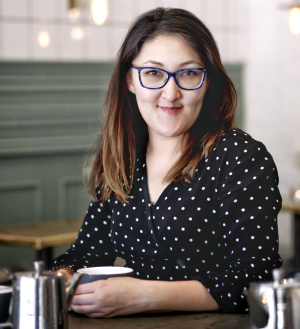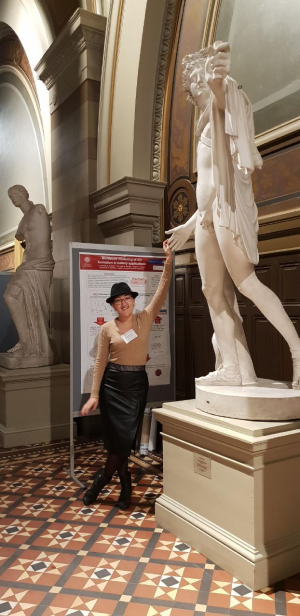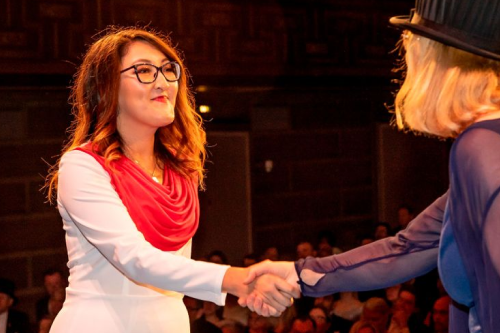"I broke the system"
Dr. Amina Mirsakiyeva is a researcher for Carl Zeiss AG, the largest manufacturer of optical systems in the world, such as medical instruments for eye surgery, lenses for cameras and high-level microscopes. Her research is on methods to produce computer chips.
Dr. Mirsakiyeva began her career in Almaty, Kazakhstan. She grew up in a modest 37 square metre home for four people. Her mother was an economist, and her father was an architect. When she was born, her mother stopped her career to take care of her family. Dr. Mirsakiyeva recalls being drawn to science and experimenting with her hands as a young girl. Her family always supported and encouraged her to do well in school and to pursue her passions. She earned her bachelor’s and master’s degrees in chemistry in Kazakhstan in 2012 and earned her doctoral degree in 2017 in Sweden. Dr. Mirsakiyeva says, “I broke the system.”
 But Dr. Mirsakiyeva’s journey to a career in chemistry was not easy. Growing up, she did not notice inequality between boys and girls in school. Even at her university young women earned half of the science, technology, engineering and mathematics (STEM) degrees awarded each year. Still, being a scientist has low prestige in Kazakhstan, according to Dr. Mirsakiyeva. “In Kazakhstan, many people don't understand what scientists do. Due to historical background Kazakhstan faced in the 1990s, the intellectual professions are highly undervalued. Teachers, doctors, and scientists have extremely low salaries and regularly have to fight disrespect from society. In my opinion, in Kazakhstan science is high prestige area in words and low prestige in reality." It was during her doctoral studies she started to really notice the gender divide. When she collaborated with colleagues on research papers, regardless of who was the lead, the men on the team always put their names first on the article. She also noticed most rectors were men and very few women were professors in science. When it came to applying for post-doctoral fellowships and lecturers, Dr. Mirsakiyeva says, “Officially salaries are always similar. However, men usually get better schedules. They are also assigned less paperwork.” Then there were the expectations of women to opt out of their careers to start and take care of their families. Dr. Mirsakiyeva was not quite ready to decide between her doctoral studies and starting a family, and she saw how judgmental women could be to those who opted to keep their jobs and leave their children with caregivers while working. She decided to apply for doctoral program in chemistry in Sweden and left Kazakhstan in 2012.
But Dr. Mirsakiyeva’s journey to a career in chemistry was not easy. Growing up, she did not notice inequality between boys and girls in school. Even at her university young women earned half of the science, technology, engineering and mathematics (STEM) degrees awarded each year. Still, being a scientist has low prestige in Kazakhstan, according to Dr. Mirsakiyeva. “In Kazakhstan, many people don't understand what scientists do. Due to historical background Kazakhstan faced in the 1990s, the intellectual professions are highly undervalued. Teachers, doctors, and scientists have extremely low salaries and regularly have to fight disrespect from society. In my opinion, in Kazakhstan science is high prestige area in words and low prestige in reality." It was during her doctoral studies she started to really notice the gender divide. When she collaborated with colleagues on research papers, regardless of who was the lead, the men on the team always put their names first on the article. She also noticed most rectors were men and very few women were professors in science. When it came to applying for post-doctoral fellowships and lecturers, Dr. Mirsakiyeva says, “Officially salaries are always similar. However, men usually get better schedules. They are also assigned less paperwork.” Then there were the expectations of women to opt out of their careers to start and take care of their families. Dr. Mirsakiyeva was not quite ready to decide between her doctoral studies and starting a family, and she saw how judgmental women could be to those who opted to keep their jobs and leave their children with caregivers while working. She decided to apply for doctoral program in chemistry in Sweden and left Kazakhstan in 2012.
While it was a good experience, academia was not the best fit for her. She realized she was more interested in the hands-on, practical application of science. She was particularly interested in polymers, and learned that Switzerland, Germany or Austria would be the best places for working on this. The only issue was – she did not speak German! This did not stop her though. In eight short months, she mastered the language enough to land a research position at Carl Zeiss AG in Stuttgart, and she now works in a very technical field using German as her primary language.

Dr. Mirsakiyeva traces her perseverance and success to support networks such as her parents, colleagues and friends along her career path, and she wants to pay the way forward to other women like her. “All my social activities are aimed to support women and help to inspire as many people as possible.” She created a project called kzphdgirlsunion for women scientists from Kazakhstan, whose goal is to raise the prestige of science in her country and normalize the image of girls and women in science. She also organizes breakfast meetings (ZagranZavtrak) for businesswomen and immigrants. She passionately believes that science belongs to everyone: she has created a podcast Belka and Strelka to explain scientific concepts in accessible ways.
Dr. Mirsakiyeva has no regrets going into science, and she says she is at a point in her life now where she feels settled and balanced and can think about having a family. She advises other women, “It is important that women are kind to each other. Patriarchy made us mean to one another. Also, remember you are the one deciding your life. If I can do it, any woman can.”
